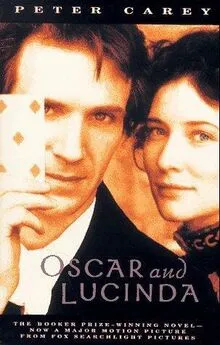Peter Carey - Oscar and Lucinda
- Название:Oscar and Lucinda
- Автор:
- Жанр:
- Издательство:Vintage Books
- Год:1988
- Город:New York
- ISBN:0-679-77750-4
- Рейтинг:
- Избранное:Добавить в избранное
-
Отзывы:
-
Ваша оценка:
Peter Carey - Oscar and Lucinda краткое содержание
The Booker Prize-winning novel-now a major motion picture from Fox Searchlight Pictures.
This sweeping, irrepressibly inventive novel, is a romance, but a romance of the sort that could only take place in nineteenth-century Australia. For only on that sprawling continent-a haven for misfits of both the animal and human kingdoms-could a nervous Anglican minister who gambles on the instructions of the Divine become allied with a teenaged heiress who buys a glassworks to help liberate her sex. And only the prodigious imagination of Peter Carey could implicate Oscar and Lucinda in a narrative of love and commerce, religion and colonialism, that culminates in a half-mad expedition to transport a glass church across the Outback.
Oscar and Lucinda - читать онлайн бесплатно полную версию (весь текст целиком)
Интервал:
Закладка:
109
A Cheque amidst Her Petticoat
When Miriam was old, she wore long black dresses and violent-coloured petticoats (crimson, royal purple, blazing yellow) and it was easy enough at that time to see her as an ugly old parrot in a Victorian cage, but when she stood in Dennis Hasset's little study-hardly a study at all for it was
A Cheque amidst Her Petticoat
what they call, in Bellingen, a sleep-out, a makeshift enclosure of a pleasant back veranda-when she stood there, she was straight and young and strikingly handsome. She had strong features, a straight nose, a long jaw, wide-placed brown eyes above defined cheekbones. She was almost severe, but yet was not severe, and her true obsessive qualities were clouded by her habit of making small flirtatious gestures which she offered-she could not seem to help herself-even when she was in a hurry. Thus she might lower her eyes, or lean forward in a certain way or even let some part of her clothing brush against her listener, all this in a soft, yes, even seductive style, while you could see, if you had an eye for these things, the tight and secret clenching of her jaw. She was in mourning for Oscar, and although she would very soon grow out of her flirtatious habits, she would never abandon this particular style of mourning. It was not a fashion in mourning. It was something she invented herself to cater for all her conflicting needs, and although this style would finally look-as I said before-cranky, Victorian, simply crazy, this was not the effect when Dennis Hasset looked at her.
She wore long black watered silk, cut tight around her well-formed bosom and flowing in expensive folds across her bustle. She wore a black veil and a black hat with feathers in it. Her petticoats showed here and there. They were bright red. They said: To hell with you; I will do what
Hike.
If Dennis Hasset had ever regretted not marrying her, this was no longer the case. He recognized her as a dangerous woman. He wished her to leave his study. She smiled at him and twice, accidentally he supposed, touched his trouser leg with the toe of her little buttoned boot. She had never guessed the size of Oscar's estate until Dennis Hasset had come to her, begging her to give it up. It was he, this handsome, educated man who trembled like a girl before the godless cedar cutters, who had tried to trick her into signing a "waiver." It was only then, and very slowly, that she began to understand about the wager which was celebrated in that rolled-up document the dead man had carried in his
little case.
It was then that she began her lifetime habit of acting against the dictates of the "best advice." The best advice would have had her still a governess, less than a governess, a target for the milky-white spew of the youngest Trevis. The best advice would have her leave the glassworks in Darling Harbour, and have her believe it quite impractical to remove them to so isolated a post as Boat Harbour. She said (many, many times): "I loved Boat Harbour. It was my home. How could I leave it?" She sold off the land in Darling Harbour and transported what she could, including glass
AO*
Oscar and Lucinda
blowers and their families, all of whom she persuaded, by dint of personal visits, gifts, bribes, bonuses, to make the dangerous sea journey north.
She did not love Boat Harbour at all. She loathed it. But now she was rich and she began a lifetime of paying back those who she felt had slighted her. And she would, in the careful, almost feudal structure she built to hold the hierarchy of offences, place this clergyman near the top of the triangle, the apex of which was occupied by Mrs Trevis.
There was no room in the little study. You sat crammed on a straightbacked chair and looked across the vicar's shoulder to the open-sided veranda where the crates of books his present circumstances made it impossible to unpack stood greying and gathering new watermarks each time the wind came from the south. Or you could, if you cricked your neck a little, look down the long thin block of land, past the vicar's Jersey cow picking what it could from the low winter grass, to where the black bones of the glass church stood, its panes mostly cracked or crazed, with long dried strands of dead water clinging to its roof.
This church belonged to Miriam, or so it had been determined in the court at Sydney. Dennis Hasset had imagined it was his, for it had been intended as a gift and he had taken it upon himself to have it transported on to his back paddock.
Miriam sat on the chair and smoothed her skirts. She placed her hands in her lap, quite so, not attempting to hide — Dennis Hasset thought her intention to be the opposite-the tell-tale roundness of her stomach. She crossed her leg, showed a little petticoat, and looked at him in such a way he could not hold her gaze.
"I have been speaking to Mr Field from Gleniffer," Miriam said, removing a black glove to reveal than an extra wedding ring had found its way on to her pretty hand in Sydney. "He says there are now fifteen Anglican families who would be pleased to fill a plate each Sunday." Dennis Hasset thought: Fill a plate. She says it so grandly, but she has not seen the coppers and threepences looking so lonely on the green felt base. When Mr Field says he will "fill a plate" he is being a grand man with his thumbs stuck in his braces, but the reality is different. They will have me, Dennis Hasset thought, riding out to Gleniffer twice on a Sunday and expect me to do it for the love of God and twopence ha'penny.
"And that is when it came to me," said Miriam, smiling sweetly, "that we might make a present of my dear little church to them. Mr Field says he has no shortage of corrugated iron, and as for the walls, he explained to me how he would fix weatherboards to it."
"How clever of him," said Dennis Hasset sourly.
"Well," said Miriam, "indeed it is. You cannot just nail a
A Cheque amidst Her Petticoat
board on to a cast-iron frame." — ;
"I never thought of it," said Dennis Hasset. This was play-acting. A weatherboard could be secured, just as glass could, on the wooden mullions.
"Spare me your wit then, Mr Vicar, and if you are so wise in these worldly things, tell me how you would fix a weatherboard to the walls of the church."
Dennis Hasset smiled at her in a way which, in any other context, would be taken to be friendly.
"With fencing wire," Miriam said. "Like a stockyard fence. But if you are wise in these country matters, you will know how to do it. But, then again, you will not need to. The Gleniffer Anglicans will be here tomorrow. There has been so much trouble with white ant they are pleased to have a cast-iron frame. But, Mr Hasset, you look disappointed."
"As you know," he said, "I had rather hoped I would at last have a church here."
"Then we must get up a fête, and raise some money," Miriam said. "But you cannot ask me to worship in my husband's tomb."
"Still, I am disappointed."
"Your Sundays will certainly be very busy."
"I do not complain about God's work, but rather that the church was intended for me. But, but," he held his hand up as if to hold off her fury, "the courts said otherwise."
"Miss Leplastrier must have been most fond of you."
"We were friends, yes." i — '
"As she was obviously fond of my husband."
Husband? How is he husband? '
"She has been in correspondence with me again. I must say I admire
• her frankness." ' "v: :•:>; ••<'-.
"Oh?" '••••\^Ji'<.-,A-,
"You are not aware of our correspondence? She does not keep you informed? And yet I understood from her when we met outside the court in Sydney that you had a detailed correspondence. Indeed, she knew so much about our little town."
"Come, Miriam, what has she said." He held out his hand to the letter that Miriam was unfolding.
"It is not gentlemanly to pry into the private correspondence of young ladies. But I will read you little pieces. She writes: 'I made a bet in order that I keep my beloved safe.' I take that ill, Dennis, that she call him Ijeloved.' I think that poor taste. What say you?"
"She was fond of him?":s<,,
427
Oscar and Lucinda
"She seems fond of almost everyone. But let me read some more: 'I beg you, please, as one woman to another, to not do this to me. I am astounded to see these words come off the tip of my own pen, but still they come. Let us not have our fears make us greedy.' Our fears, "said Miriam,
"make us greedy. Really, I can't think what she means. 'When I walk the streets of Sydney I realize I cannot bear to be an impoverished woman here. Please, Mrs Chad wick, if you have any Christian charity at all, you will allow me to keep some small percentage of my fortune.' " Miriam then folded the letter and placed it in her bag.
"So," she said.
Dennis Hasset's lips parted and his eyes narrowed a fraction.
"So," he said, "and what do you reply?"
"I replied sympathetically, of course. How could I not be sympathetic, I who have spent half her life in mourning rags, as I am again. I have an intimate knowledge of the poor woman's situation. It is I, after all, who was brought to this town through ill-fortune, was shipwrecked, and although a governess have had to suffer the indignity of a life better suited to an Irish servant. I know, better than she knows, what her situation must mean to her."
"And your response?"
"I worked as a servant," Miriam repeated. "I set fires. I milked cows when I should be teaching them their Shakespeare and their Milton."
"And you would have her do the same.",-^ , t
: "Dennis, you think me hard." — .
; "Mrs Chadwick," he said. -,
"Hopkins," she corrected.
"Mrs Hopkins," he said, "let us not be enemies."
"Mr Hasset, you are in such a rush to be friends you are stamping on my feet. Have I not said I will donate my little church to your Gleniffer Anglicans?"
"Indeed you have."
"Why then, I am dispatching today my cheque to Miss Leplastrier. It is not a fortune, but certainly should be some assistance to her in her present needç." It was this cheque which occasioned the short letter from Lucinda to Miriam which was unearthed nearly half a century later amongst Miriam's darned and fretted-over petticoats. By the time it was found, her letter was as fragile as the body of a long-dead dragon-fly. Its juice was dry. It was history. Lucinda was known for more important things than her passion for a nervous clergyman. She was famous, or famous at least amongst students of the Australian labour movement. One could look at
458
Songs about Thistles
this letter and know that its implicit pain and panic would be but a sharp jab in the long and fruitful journey of her life. One could view it as the last thing before her real life could begin. But in 1865, Lucinda could not be so disengaged and she had written with passionate downstrokes on poor quality paper which was speckled like a plover's egg, and spotted with dark blue patches where the paper drank over-thirstily of the ink. It was a letter written by a weary woman with red eyes and scalded arms, an employee of Mr Edward Jason's Druitt Street pickle factory.
Читать дальшеИнтервал:
Закладка:









